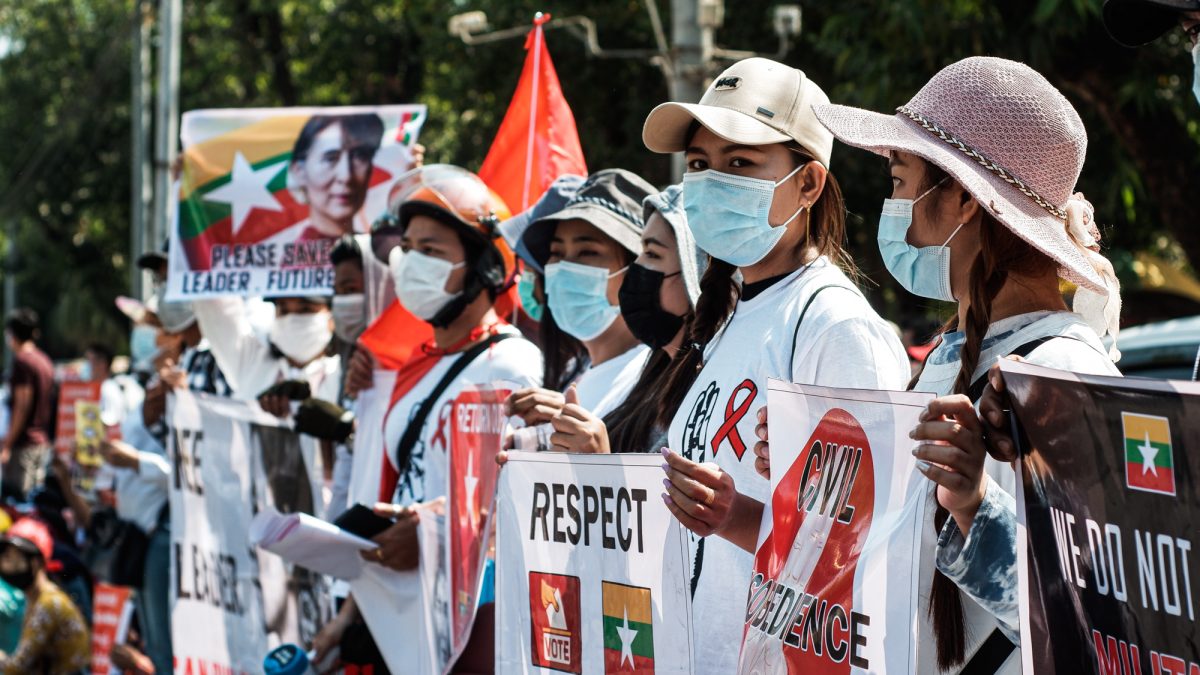Police stations aflame. Bombs thrown at army trucks. Civilians taking to the street to fight for democracy. Sniper bullets aimed at their heads. This is the reality of the military coup d’état in Myanmar.
It came February 1, after the National League for Democracy (NLD) won the 2020 nationwide elections by a landslide in November. But the military, known as the ‘Tatmadaw,’ were fixed on calling it “election fraud.”
I had a chance to chat with my aunt, Mimi, about the situation. Auntie Mimi has always been active in campaigning for democracy in Myanmar (formerly known as Burma). After lobbying to Congress and the United Nations, and working with the US Committee for Refugees following a nationwide protest for democracy in 1988, she was branded as a “traitor to the state” by the military junta group.
Myanmar was never one nation. The different regions and ethnic groups were separate kingdoms, until the British came and colonized them as one in the 1800s. After forming the people’s army and gaining independence in 1947, Myanmar’s founding fathers were assassinated while writing the constitution. Imagine, my aunt told me, James Madison, John Adams and George Washington assassinated, before finishing the US Constitution for the nation they had fought so hard for.
After a brief period of democracy, the army seized control of the delicate nation in 1962. Myanmar went through sixty years of military rule, with protests every decade or so that were brutally put down (1974, 1988, 2007).
Only in 2011 did the country begin to transition to quasi-civilian rule and a democracy, with the opposition NLD party and the military starting to work together for the first time. The 2020 elections were only the third elections after the start of this transition. The NLD won the elections by a landslide, as they did in 2015. They had been talking about removing the army’s guaranteed 25 percent of parliament seats, and the army felt threatened and seized total power again with the coup d’état.
Mimi and her husband own a restaurant in a fairly rural part of Myanmar. They are currently remaining there to be away from the turmoil in cities, where protesting civilians have been clashing with police and soldiers, resulting in hundreds of casualties. “We can’t tell how it’s going to end up. It’s a freefall,” Mimi said.
Civilian lifestyles have been significantly affected by the coup. All mobile internets have been shut down, because the military does not want protestors to communicate with each other. “We are fortunate to still have the internet because we have a business and ours is fixed [to the wall]. But even then, ours shuts down at midnight and comes back on at 8 or 9 in the morning,” Mimi said.
The virtual private network she is using, however, cuts in and out. It even crashed during our interview, and I called her back twice before the connection returned.
Banking has also been affected. Many civil servants have been joining the mass Civil Disobedience Movement (CDM) and are not going to work, so all banks are practically closed. People without ATM cards are struggling, and people with cards are only allowed to withdraw 200,000 kyat a day, which is about $142.
The coup is not the only issue citizens are facing, with the pandemic causing additional stress. My aunt’s restaurant has not been open since the start of the pandemic, like many other businesses in Myanmar. So, to have some income, my aunt started to teach English to students online.
She also started another business with her husband, that they hope will generate income internationally. “We came up with a product we can sell overseas. We started shipping our fish soup paste, mohinga (a national favorite dish). We’re [also] trying to work on let thoke, Burmese salad dressing,” she said.
Mimi and Patrick have a shop in Yangon, the biggest city in the country, which they had to close, due to protests and shootings occurring around it.
This is not what they had been expecting. People were starting to finally have hope for normalcy, since the AstraZeneca vaccine was on its way. “We were all cleaning up and getting ready to open our business on February 1, and guess what happened? The coup happened,” she said.
Every day, she hears about the killings and brutality happening on the streets, and she says it’s “heartbreaking.” I know she’s passionate about this, she’s been flooding my WhatsApp with links to articles and long messages about how she feels. “I have so much to say but I don’t want to inundate you,” read one of her messages.
“It’s just miserable, because [the military has] no control on the ground. I don’t think [the generals] know how bad things are on the ground,” she said.
The internet has been a benefit for this generation of protestors in Myanmar. It has allowed Generation Z to become more politically aware, leading them to come together more and stand up for what they believe in.
“They can see for themselves. They don’t have to believe the military’s brainwashing. And there’s less inter-racial, inter-religious discrimination,” she said.
This is also the first time the major ethnic groups in Myanmar are really intertwining and uniting. Many people within the country have mixed ethnicities and can’t be defined by one word, like many students at WIS.
“They’re coming together with the ethnic groups. My mom is Karen [Christian] and my dad is Bamar-Shan [Buddhist]. So there are many of us who are all mixed,” she said. “You can’t say you’re German or you’re Burmese, you [are] everything,” she referred to me, also of mixed ethnicity.
People are pushing for the Federal United States of Burma, like the US, my aunt told me. They are tired of being left behind by their own government, and by the rest of the world, which is progressing, while Myanmar still has no democracy or equal rights. “People are just fed up, they all want these ethnic identity policies to go away, have one national unity, one Myanmar identity, like America. You’re American, no matter where you come from,” she said.
In order to make a difference, my aunt said people in the US should lobby the government, journalists, ASEAN countries and the UN Security Council to not support the military government in Myanmar. They should impose sanctions and encourage peaceful negotiations.
“[Tell them] to not support this military conduct that is not accepted by people at all, that’s oppressive and that’s killing people daily,” she said. “[And we must] train them to be more honorable. An army cannot run a country, [but] maybe civilians can run a country.”
My aunt hopes that the international community will stand by the people of Myanmar. “Recognize the government that the Burmese people recognize,” she said.
She wants other countries to learn from this as well, and learn to listen to different types of people and ethnic groups. “The world should pay attention to the voices of all the parties in the country,” she said. “Not just who has the guns and who has [seized] power in the government.”
By Naomi Breuer


































































